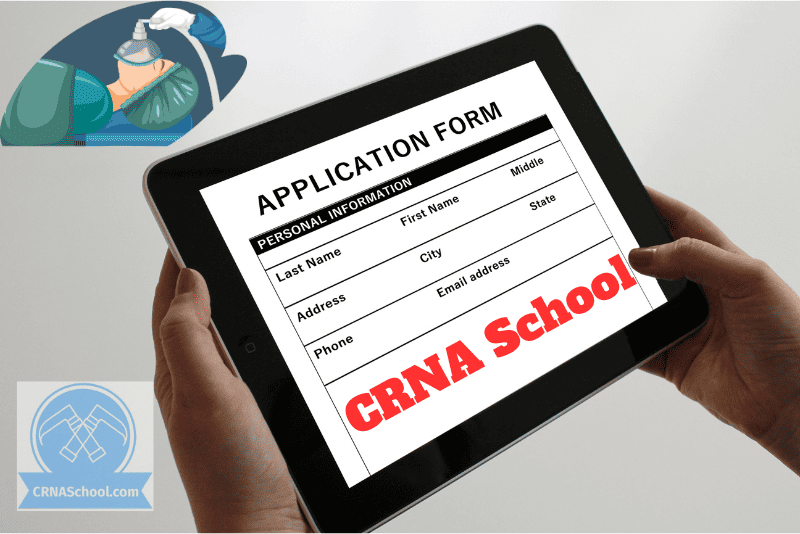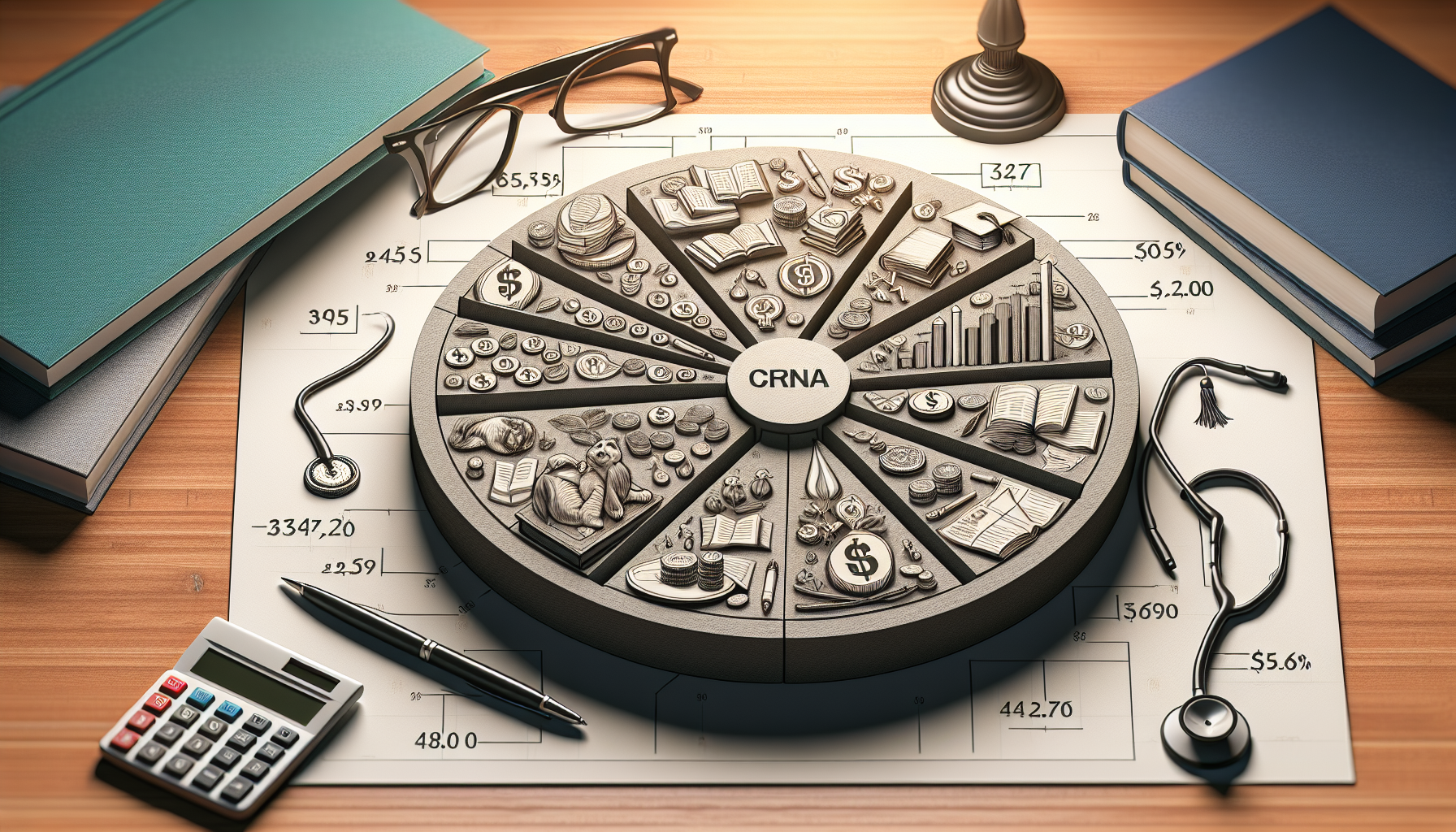Are you looking for a future as a CRNA?
Selecting the best nurse anesthesia schools for you is vital. This essential guide walks you through the selection process, helping you understand the prerequisites, the financial investment, and the career prospect of becoming a nurse anesthetists.
Equip yourself with the knowledge to choose wisely and start your CRNA journey into nurse anesthesia schools admission requirements.
Key Takeaways for CRNA Schools
- By 2025, all CRNA programs will transition to offering Doctor of Nursing Practice (DNP) degrees aligning with new accreditation standards; thus, discontinuing Master’s degree programs in nurse anesthesia.
- Admission into a CRNA program is highly competitive, with acceptance rates around 26%, emphasizing the importance of substantial ICU experience, a well-crafted personal statement, and strong academic background for successful entry.
- The financial implications of CRNA education are substantial with program costs ranging widely by state, highlighting the need for prospective students to consider tuition trends, scholarships, financial aid, and effective budgeting strategies.
Exploring Nurse Anesthesia Educational Programs

Nurse anesthesia educational programs, also known as Nurse Anesthesia School, offer various types of degrees such as the Master of Science in Nursing Anesthesia (MS, MSN, MSNA) and Doctor of Nursing Practice in Nurse Anesthesia (DNP,DNPA,DNPNA).
Changes in the degree earned will transition towards offering a Doctororate degree and will should be complete by 2025 for all CRNA schools by state and becoming the standard three-year requirement for these programs.
The Council on Accreditation of Nurse Anesthesia Educational Programs oversees these state CRNA schools, to ensure that their graduates are well-prepared to perform Anesthesia and procedures as highly skilled nurse anesthetists.
The number of CRNA programs is not evenly distributed throughout the United States. Some states have multiple schools available for students who wish to pursue this career path as a CRNA while other states have no CRNA programs.
For Example, the State of Alabama has 3 Nurse Anesthesia Programs while right next door Mississippi has only 1 CRNA School.
Navigating CRNA School Admissions

With the increasing number of applicants to CRNA schools, the admission process has become more competitive than ever. Some programs have even seen a fourfold increase in the number of applicants compared to previous years.
This suggests that a robust educational background is vital for application success. Indeed, the typical acceptance rate for CRNA programs in the United States is a mere 26%, underscoring the highly selective nature of the admission process.
However, don’t let these statistics deter or scare you. Instead, consider them as a motivation to meticulously prepare your application, understand the admission criteria, and ace the interview process.
In the following subsections, we’ll break down each of these steps, offering tips and strategies to navigate the competitive CRNA school admissions process.
Preparing Your Application
When it comes to your CRNA application, one crucial aspect that can make a difference is the amount of experience you have in ICU. It holds significant weight and experts recommend having at least 2-3 years of critical care experience before applying.
Just having the necessary experience is not enough, displaying strong leadership skills also plays a vital role. As an applicant for CRNA programs, you are expected to showcase qualities such as initiating growth, delegating tasks efficiently and contributing towards maintaining a safe working environment.
Your personal statement is also crucial part of your application. It’s your chance to showcase your enthusiasm for the nursing profession and becoming a CRNA. A compelling personal statement can distinguish you from other applicants in these competitive programs.
When writing your statement, focus on what personally motivates you, your career goals, and relevant experiences in nursing or healthcare. Demonstrate your keen interest in the medical field.
By integrating these elements into a narrative about your journey, you can show your dedication and passion as a prospective nurse anesthetist. This not only adds value to the student body but also appeals to the admissions committee, who are seeking the most fitting candidates for their program.
Understanding Admission Criteria
Understanding the admission criteria for CRNA schools is an important step in successfully applying to these programs.
The usual requirements for gaining entry into a CRNA program include having a Bachelor’s of Science in Nursing (BSN) degree, holding a Registered Nurse (RN) license, meeting specific critical care experience hours, completing designated coursework, and achieving satisfactory scores on standardized tests such as the GRE.
A minimum grade point average (GPA) of 3.0 is typically expected for acceptance into CRNA schools. This may vary among institutions. In some cases, the requirement for submitting GRE scores may not be required at certain schools.
When it comes to clinical experience, most crna schools require applicants to have at least one year of recent RN experience specifically in adult critical care units. This serves as essential preparation before enrolling in any nursing program and enables students with real-life exposure that will benefit them during their studies and future careers as nurses.
The Interview Process
One essential aspect of the CRNA school admissions process is the interview. Adequate preparation for a CRNA school interview includes having a strong grasp on relevant subject matter, maintaining humility, being mindful of what information to share and keep private, practicing an elevator pitch explaining one’s motivation for pursuing this career path, and thoroughly researching the program’s mission in order to engage effectively during discussions.
Some common errors made during these interviews include lack of readiness for typical questions asked by panel members, inappropriate attire choices that don’t align with professional standards required at crna schools or programs, and inadequate stress management techniques exhibited throughout the conversation.
To avoid making these mistakes, it is important to research commonly asked questions beforehand so as prepare appropriate responses, dress professionally according to accepted guidelines, demonstrate effective coping mechanisms when under pressure while conversing about pertinent matters with admission staff members.
Post-interview follow-up also plays a crucial role in solidifying your chances. A well-written thank-you email or hand deliverd note expressing gratitude towards those involved in arranging subsequent steps (like interviews) including specific details covered earlier by both parties serves as a great way set stage preparing remainder selection processes. It’s also entirely acceptable to write a director who interviewed you separately and send them a gift basket course!
A State-by-State Guide to CRNA Schools

CRNA programs are offered in different states throughout the US, with some states having multiple options for those interested in becoming Certified Registered Nurse Anesthetists. Some states do not have any options inside their borders for one to attend CRNA school.
Some of the highly applied to schools include Franciscan Missionaries of Our Lady University in Louisiana, Michigan State University in Michigan, Lincoln Memorial University in Tennessee, and Cleveland Clinic School of Anesthesia located in Ohio.
Selecting the right CRNA program for you involves considering not just the variety of available institutions, but also comparing tuition costs across states and exploring potential scholarships or financial aid options each university offers.
It’s important to note that the cost associated with CRNA training can vary greatly from one state to another.Therefore, it’s crucial for aspiring nurse anesthetists to understand trends when it comes to determining which school would be suitable for them financially.
In making this decision, factors such as studying costs at various places; not forgetting the plethora of scholarship grants obtainable should allbe considered thoroughly.If considering enrolling into a university, costs based in Ohio or Tennessee may vary compared to other regions.Thus, having comprehensible knowledge about these topics and their effects on the costs may play a significant role in determining which institutions to make successful academic decisions.
The Road to Certification: National Certification Examination Prep

The NCE is a crucial milestone on the path to becoming a certified registered nurse anesthetist. Administered by the NBCRNA, this comprehensive exam evaluates the knowledge and abilities necessary for one to nurse anesthetists.
To be eligible to take the National Certifying Exam, one must have completed an accredited Nurse Anesthesia Program and met all the guidelines set forth by your school to allow you to take the exam.
Making sure you have adequate preparation for the NCE is one of the final steps in becoming a Nurse Anethesist. The first-attempt pass rates varies from school to school and year to year anywhere from 60% to 100%.
The exam is offered for one to take up to four times a year in the event that someone is not able to pass on their first time. Aspiring Nurse Anesthesiologist must consistently work and study to improve their skills and clinical knowledge to succeed in these exams and achieve their goal of becoming fully licensed. Perseverance and diligence in this journey are key to expanding their professional capabilities
Future Nurse Anesthesist should not overlook key factors in their complex and evolving field of anesthesia. Certifications and continuing education emphasize the importance of comprehensive education, not only for patient care but also for developing dynamic and competent colleagues in the anesthesia field.
Anesthesia involves extensive learning and hard work in both academic and residency settings, for multiple areas including surgical procedures, operating room , and administering various anesthetics and pain management protocols.
CRNA’s must be equipped to handle diverse challenges, including managing pain and assisting in the comfort of distressed patients in the Emergency department.
CRNA’s roles require control, fast decision-making, and adaptability to different medical needs. A skilled Nurse Anethesist focus should be on understanding and addressing the root of a patient’s problem, informed by a combination of professional training and personal care.
The Financial Aspects of CRNA Education

One of the biggest concerns about applying to CRNA school and getting accepted is the ability of one to be able to afford the tuition and other cost surrounding getting into school.
Navigating the financial aspects of pursuing a CRNA education can be overwhelming. To give you an idea, here are some average tuition costs for CRNA programs across the US: there are tuition-free options available, but in general, full program costs range from $0 for the military schools all the way up to $180,000+.
The cost of education has drastically gone up in the previous 10 years. Part of the reason for the increase in the tuition cost is because the schools are transitioning to Doctorate programs and this increases the amount of time it takes to complete the degree.
Most schools were averaging 24-28 months when providing a Masters degree while most schools now are in the 36 month range.
Another significant factor to consider is the loss of income during years of intensive study because one is not allowed to work while in Anesthesia school. The demanding coursework and clinical rotations often make it difficult or impossible to work, adding to the overall financial strain.
To tackle these challenges better and get a better hold on what you can expect, let’s take a closer look at how tuitions vary by state. What scholarships & aid opportunities exist currently? As well efficient budgeting strategies one should consider when planning success post-graduation financially-wise too.
Obtaining a DNP degree in anesthesia can cost over $100,000, so it’s crucial to thoroughly research and consider this investment. Keep in mind that the cost varies across different states and institutions, as shown by national surveys and data.
Tuition Trends Across the States
Tuition costs for CRNA programs can vary widely across the United States. Some regions offer more affordable options, while others, particularly those with prestigious institutions, may have higher tuition fees. This variation reflects differences in location and university reputation.
CRNA programs will require a significantly more financial investment compared to other nursing programs. Tuition fees for these specialized programs range broadly, with some schools offering more budget-friendly options per semester. Understanding these variations in tuition costs and what you can afford is crucial in making an informed decision about which school best fits your financial and educational needs.
Scholarship and Aid Opportunities
Understanding tuition costs is important, but it’s also essential to research scholarships and financial aid options. The AANA Foundation offers specific scholarship opportunities for full-time students who are enrolled in an accredited nurse anesthesia program and are members of the organization. Another option is the Duke University NA Merit Scholarship, which provides a substantial $68,400 tuition scholarship for incoming Fall 2023 DNP Nurse Anesthesia students.
Aside from scholarships, there are other ways to fund your education, such as financial aid. Some possible sources of financial assistance include grants and awards from organizations like the AANA Foundation, filling out a FAFSA form, PLUS loans offered by federal government programs, and private student loans.
When exploring funding support or merit-based scholarships for your Nurse Anesthesia degree, it’s crucial to inquire with the school’s financial advisor about grant and scholarship opportunities. Many of these grants and programs have specific qualifications and deadlines.
Make sure you complete all necessary application processes, including submitting required documentation, and stay updated on current offerings each academic year. The financial advisor at your school can be an invaluable resource in guiding you through this process.
Budgeting for Success
One of the best plans for budgeting for CRNA School is to have all the money for the school and living expenses already saved up.
Of course that isn’t what the majority of people are unable to save that large amount of money that it requires to obtain a degree in Anesthesia.
Maintaining sound financial health during your CRNA studies is essential for your survival and to reduce the stress you already have with school.
There are lots of ways you can disclipline your pocket book and spending while in Anesthesia School. A simple yet effective approach is the 50/30/20 rule, where you dedicate 50% of your income to essential expenses, 30% to discretionary spending, and 20% to savings and debt payments.
This method makes budgeting straightforward and helps balance your financial priorities. Regularly reviewing your spending and identifying areas to cut costs is also crucial. Additionally, looking into renegotiating your current debts for more favorable interest rates or refinancing options can significantly help in managing your finances more efficiently.
To ensure financial stability during your CRNA education:
- Keep a clear understanding of both incoming funds and outgoing expenditures.
- Create a feasible budget that meets your needs.
- Manage time efficiently if you are able to work during school.
- Seek assistance from financial advisors when needed
- Prioritize self-care while juggling academic demands alongside personal life responsibilities.
- Utilize available programs designed specifically for those working in the medical field, so take advantage if necessary.
- Establishing an emergency fund will also provide peace of mind should unexpected costs arise.
In summary, managing finances during CRNA education involves careful tracking of expenses, reducing costs where possible, and efficient time management. Prioritize wellness without extra costs and manage debts effectively. Be open to seeking financial assistance and take advantage of plans for medical professionals.
Succesful financial planning for CRNA school starts well before you apply to any Nurse Anesthesia Program. If you begin now to concentrate on planning financially for the long term, preserving a good credit score, and gradually reducing debt it will drastically help you budgeting while you study for a career in anesthesia. Additionally, establishing a savings buffer is essential for ensuring financial stability in the future.
Advancing to Doctoral Degrees in Nurse Anesthesia
Starting in 2025, obtaining a Doctor of Nursing Practice (DNP) degree in nurse anesthesia will be a requirement for CRNA programs.
A DNP degree elevates an individual’s capabilities and knowledge, expanding the nursing knowledge base, fostering leadership qualities, and encouraging evidence-based practice. The program emphasizes driving organizational change and elevating healthcare quality standards.
To transition from a master’s degree in nurse anesthesia to a DNP, the Post-BSN to DNP Pathway is essential. This pathway incorporates courses that blend scientific research with clinical practice, equipping students for certification as registered nurse anesthetists.
The Clinical Experience in CRNA Programs
A significant component of CRNA programs is the clinical experience one gets by going to hospitals and being paired with practicing CRNA to learn the application of things they learned in class.
Most programs which requires completion of around 800 cases and over 2,500 hours of practical training. Most programs have a minimum requirement of approximately 1595 to 2500 hours for this aspect.
The Council on Accreditation (COA) for Nurse Anesthesia Educational Programs mandates that CRNA students complete more than 2000 hours of direct clinical practice in anesthesia administration.
This rigorous training is essential for cultivating important abilities like manual dexterity, professional conduct, quick decision-making, problem-solving skills, and a thorough understanding of anesthesia pharmacology and advanced methodologies.
The clinical experience offered by CRNA programs plays a crucial role in enhancing learning outcomes while also promoting personal and professional growth for aspiring Nurse Anesthetists. Hands on training gives the students valuable opportunities to apply their theoretical knowledge in real-world scenarios – ultimately preparing them for a successful career path into the field of nursing anesthesia.
The Role of Accreditation in CRNA Education
Accreditation is crucial for CRNA education and the Council on Accreditation (COA) is responsible for accrediting nurse anesthesia programs.
This accreditation protects and provides guidelines that graduates of these programs are skilled in administering anesthesia safely.. COA accreditation requires strict adherence to standards, including a thorough self-evaluation and an onsite inspection for each CRNA Program.
It is important to choose an accredited CRNA program and it helps to know when the next accreditation year is for the school you are going to apply. The COA guidelines helps guarantee that students receive comprehensive training necessary for safe administration of anesthesia throughout their training.
CRNA programs are periodically reviewed by the COA every 4 to 10 years, typically at a 9-year average interval. This review process reflects the program’s current level of stability or development.
Career Outcomes for CRNA Graduates
After finishing a CRNA program finding a great place to work and starting a rewarding career has never been brighter. There have been some recent legal changes, such as inclusion in Medicare’s direct reimbursement rights and anti-discrimination measures in 2020, have led to fair recognition and compensation for CRNAs among healthcare peers.
This advancement is vital for their professional development and financial security. Given that over 80% of rural counties rely on CRNAs as their main providers of anesthesia, the significance of their contribution to these communities is immense.
The varying attrition rates (ranging from 0-28%) at different schools reflect the dedication towards student success by programs which carefully select candidates for admission.This may have an impact on job prospects post graduation since it can affect workforce availability and competitiveness within the job market.
Aligning with Professional Organizations
Becoming a member of renowned professional organizations such as the American Association of Nurse Anesthetists (AANA) offers numerous advantages to nurse anesthetists, including:
- Improved patient care outcomes
- Better career advancement prospects
- Access to comprehensive employee benefits package
- Ample networking opportunities through AANA’s events, mentorship program, and student seminars.
Remarkably, 86% of registered nurses practicing in the US are affiliated with AANA. This highlights the significant role that these professional bodies play in enhancing CRNAs’ careers. To joining AAN.
Leveraging the Academic Common Market
The Academic Common Market is a program that grants discounted tuition to college students from 15 SREB states who wish to pursue degrees not available at public institutions in their home state. This enables them to pay the same tuition fees as in-state residents when attending out-of-state schools.
To be eligible, individuals must meet specific residency requirements and fulfill admission standards set by the university offering their desired degree.
Participating states of the Academic Common Market include Alabama, Arkansas, Delaware, Florida, Georgia, and Tennessee.
Kentucky,Louisiana, Maryland, Mississippi, Oklahoma, Tennessee, Texas, Virginia, and West Virginia.This means prospective CRNA students have access to reduced-tuition enrollment options for nurse anesthesia programs outside of their own state through this program’s participation and availability within each participating institution.
The opportunity exists for aspiring CRNAs to enroll into out-of-state colleges with nurse anesthesia courses is a great opportunity for thos not having a Nurse Anesthesia Program in their state.
Finding a CRNA School Summary
Becoming a Certified Registered Nurse Anesthetist is challenging, but it is something one can achieve if they put the time and energy into doing it.
Becoming a Certified Registerd Nurse Anesthesiologist requires careful planning and decision-making at every stage – from selecting the appropriate Nurse Anesthesia Program to navigating the competitive admission process, passing the National Certification Examination, and managing financial aspects of your education.
While this path might appear challenging, with the right guidance and resources, you can confidently navigate its complexities. Keep in mind that the journey to becoming a CRNA is akin to a marathon rather than a sprint, requiring patience. Your perseverance, commitment to nursing anesthesiology, and dedication to the field will ultimately lead you to realize your ambition of becoming a certified registered nurse anesthetist.
Frequently Asked Questions
How many CRNA schools are in Pennsylvania?
In the state of Pennsylvania, there are a total of 14 approved CRNA schools that provide nurse anesthesia degrees. These accredited institutions offer comprehensive training and education for individuals interested in pursuing careers.
How do I become a CRNA in Colorado?
To pursue a career as a CRNA in Colorado, the first step is obtaining an BSN degree and becoming a registered nurse (RN). Anesthesia programs typically takes two years to complete. Once you have successfully completed this nursing program, you can begin your path towards achieving your goal of becoming a certified registered nurse anesthetist.
However, there are currently no Nurse Anesthesia Programs in the State of Colorado
How many CRNA schools are in Maryland?
In Maryland, there are currently three CRNA schools that have been accredited and offer a total of three Nurse Anesthesia programs. These programs specialize in training nurses to become skilled anesthesiologists.
As for the latest update, all this information remains valid at present time. So far, so far.
How long did it take you to become a CRNA?
Becoming a CRNA typically takes an average of 7-10 years, which includes obtaining a bachelor’s degree in Nursing, acquiring experience in critical care work, and completing the required CRNA program. The process may involve spending approximately 2-3 years pursuing either a DNP or DNAP degree after earning their BSN and RN license.
What degree options are available within nurse anesthesia educational programs?
Academic institutions offering nurse anesthesia programs provide a variety of degree options, such as Master of Science in Nursing Anesthesia (MS, MSN, MSNA) and Doctor of Nursing Practice for Nurse Anesthesia (DNP, DNPA, DNPNA). It is important to select the degree that aligns with your career goals within the field of nursing.
All CRNA (Certified Registered Nurse Anesthetist) programs are transitioning to a doctoral level, marking a significant shift in the educational standards for nurse anesthetists. This change reflects the growing complexity of healthcare and the need for advanced training and knowledge in the field.
The move to a Doctorate degree aims to enhance clinical skills, promote a deeper understanding of medical procedures, and provide a more comprehensive approach to patient care. This advancement ensures that future CRNAs are well-prepared to meet the challenges of modern medical environments, contributing significantly to patient safety and healthcare outcomes.
